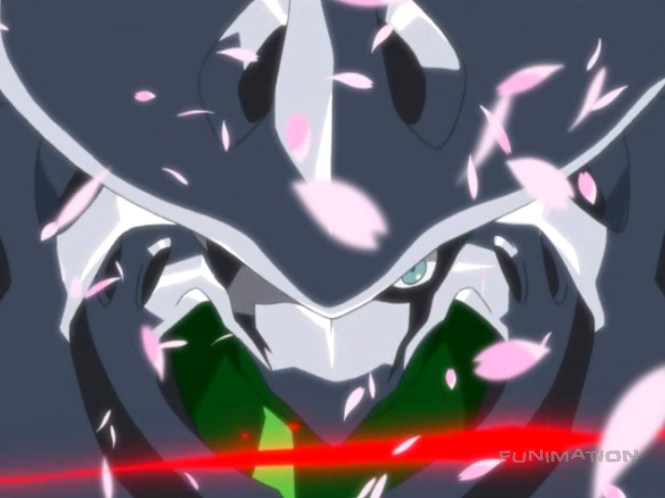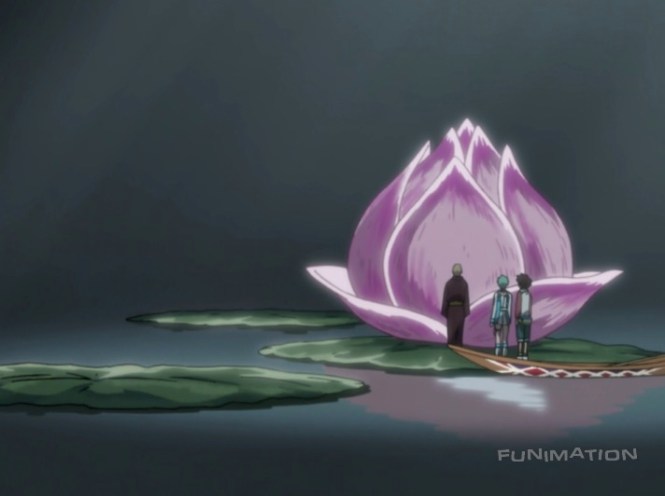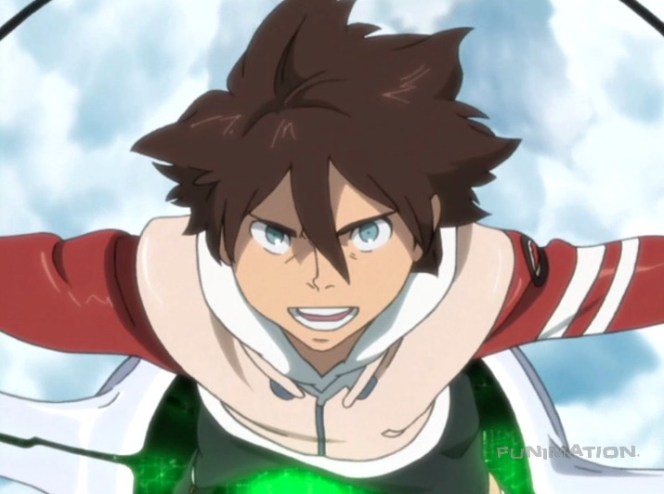Much like Eureka 7 itself, my thoughts on the show are scattered, wide-ranging, and affectionate—so in lieu of anything resembling a traditional review or reflection, I present you with a series of mini-essays on various aspects of the show.

I. On Eureka 7, BONES, and Anime at Large
Eureka 7 is both one of those shows that demonstrates why anime as a medium or an industry or whatever you want to call it is is special, and yet another block in the edifice of studio BONES that represents why it’s what I consider to be anime’s best studio.
We all know (or, if you don’t, consider this your notice) that anime studios are not monolithic. They are fluid entities made up of some core staff, but supplemented by large numbers of freelancers. So to say that any studio has a particular wheelhouse must always be tempered by the counterpoint that there will always be exceptions to the rule. For BONES, though, Eureka 7 falls squarely into the category of what are “BONES anime” for me. Qualifying what exactly I mean by this is difficult, but there’s a sprawling sense of ambition and a deep love for ideas and characters that pervade the studio’s signature works. I don’t really think a show like Eureka 7 could have been made anywhere besides BONES—although maybe that’s just my huge BONES bias speaking.
The other thing about Eureka 7 is that it’s a show I see as distinctly anime, in that I can’t imagine it being made (either in terms of actual creation or in terms of industry reality) any way besides anime. I mean, a 50-episode sci-fi TV series with two teenage protagonists that deals the huge range of themes that Eureka 7 does, plus giant robots, in live-action films or television? Forget it. There’s no audience, no will, and no money for it. But we have anime, and so we have Eureka 7, too.

II. On Things Left Loose
What a colossal mess of a show. I loved it. When I call it a mess, though, I don’t mean it in the sense of something that’s poorly put together or otherwise executed in a way that ruins its effectiveness; rather, Eureka 7 is the kind of mess of a show that’s born for clear passion, excitement and love for creation. If you happen to be the nitpicking type that wants every detail neatly wrapped up and every corner fully explored, Eureka 7 is not the show from you. There are a hundred different bits of the show that never really get explained: the ring Renton finds in the amber, the connection between the book Holland’s always reading and Renton’s sister, the almost hilariously truncated reunion between Renton and his father, who never says even a word, etc. It goes on and on, but getting caught up in the details of Eureka 7 is a good way to miss the forest for the trees or, like, the sticks on the branches of the trees.
It’s also kind of a thematic blender, with thoughts on environmentalism crossing lines with ideas about racism and acceptance bleeding into anti-war, anti-violence theories intertwining with the power of love, garnished with bits on religious persecution, free will, redemption, atonement, inheritance, generations, childhood, adulthood and a metric ton of other stuff.
Now, do all these loose ends mean that bits and pieces of the show (particularly towards the end) have weaker emotional impacts than they could? Yeah. Does it matter? I’m inclined to say no. I will take 100 Eureka 7’s and their messes of idea bolstered by (perhaps self-indulgent) passion – they made a Macross style “no smoking on the bridge” joke!! – over the tightly scripted, sometimes more emotionally impactful shows. The humanity of the creators just bleeds through every moment of Eureka 7 and I wouldn’t have it any other way, even if it means trying to wrap my head around its entirety is an impossible task. This is a Big Show. I love how much is crammed into it. The fact that things are left behind is not really a strike against it, because the things that inevitably replace them are also good.

III. On the “Return to Earth” and the Final OP
I think one of the most enduring images of Eureka 7 for me will be the still that appears at the end of the fourth and final OP for the show. In it, Renton, Eureka, and the three kids all hold a miniature globe in their hands. Amazing grace, indeed. To me, this is perhaps the greatest thematic statement from Eureka 7 amidst everything else it offered—the beauty of the innocence of childhood and hope for the future. That still is everything Holland, for all his faults and failings, was fighting for—for the future, for hope, for life. The promise of the world in the hands of children. And Renton and Eureka become surrogate parents for those three! Ahhh, it’s lovely! It’s incredible! The beauty of growth that children, without aspiring to, can reach!
Eureka 7, Renton, and Eureka (as well as others) consistently frame this order as “family,” but I think that’s a word used because no other words are sufficient to describe the grand explosion of potential and humanity that it represents. It is one of those things that is ultimately ineffable because it transcends the goodness of human structures – it is a sheer good. It is love. Place the world in the hands of children and perhaps all will not be lost.
There is a liminality to Renton and Eureka, as is fitting for two teenagers caught somewhere between childhood and adulthood (remember how angry Eureka gets with Talho when Talho calls Renton a kid?), and this is highlighted by their relationship with the kids and with the adults of the Gekkostate. It raises a question, particularly since the two of them disappear with the Scub Coral into space and the epilogue leaves us primarily with. The future they leave is one that’s left Axel Thurston with Maurice, Maeter, and Linck. So the hope is passed on to children once again. It does leave one, especially being in my adult years myself, with rather bittersweet feelings. Bitter: away we go. Sweet: the hope left behind gleams brightly.

IV. On Mythology, Images, and Acperience
I exaggerate a little bit, but there are few things in Eureka 7 I loved more than the image of Norb taking Renton and Eureka to Sakuya’s flower in a boat. It is not quite Lady of the Lake, but there is a distinct sense of an “image seen before.” This is rather different that crossing over the river of death—although Sakuya’s flower opening presumably leads not just to her and Norb’s unification but also their passing away. The sense of someone in waiting pervades the moment, and so the familiarity of the mythological moment lends us a sense of coming home. Sakuya and Norb are a love story, like Dominic and Anemone, that winds up rather truncated (see Section II), but I wonder if it is also perhaps the greatest love story in Eureka 7 because of the great physical and temporal distance that separate the two lovers (rather than those of emotions and communication). How many years does Norb say he was away? 40? Tremendous love overcomes. This, too, is a mythology.
The four “Acperience” episodes are interesting because, at least from what I gathered, they are experiences of the world with the minds of the Scub Coral—granted, the fourth Acperience is one of peace when compared to the disturbing first two, so there isn’t necessarily a consistency there than necessarily bears this out. Regardless, “Acperience” is likely Eureka 7‘s deepest mythology in that it represents an kind of common experience. All the crazy imagery serves to link subjective visions together, chaining them together. Also, it looks cool and felt proto-Soul Eater to me. This is the kind of weirdness I can get behind. There’s a groundedness to the abstraction. Perhaps this is mythology.
Incidentally, “you thought this was a distant planet, but it was me, Earth!” is mythology, too.

V. On Characters and Romance
One of the reasons Section II is ultimately a non-factor is that Eureka 7 is about the characters. There are a lot of characters in this show and they kind of pop up and leave at intervals, but all the mains get a moment in the sun. Doggie becomes the new pilot, Talho becomes more awesome than you can imagine, Holland actually gets his shit together after like 30 episodes, Stoner (lol, his name is literally “Stoner”) captures the iconic image of Renton and Eureka, Gonzy was a Coralian all along!, Gidget teaches Eureka about make-up, etc.
On the other side, Dominic takes forever but finally comes around and shows up in time to avert the suicidal Anemone—and this leads into something else that is important in this show. Loooooove. First: the freaking moon is etched with a middle schooler’s declaration of love. Are you kidding me? We loved each other so much that our robot beamed out hearts and engraved our hearts on the moon until the end of time (I should have put this in Section IV)? Wow, talk about legends. Not all the romances in Eureka 7 get the same treatment, of course, but in Talho and Holland and their baby we end up back at Section III. Dominic and Anemone are just cute (somewhat to my disappointment). Even the established relationships on the Gekko (Hilda and Mathieu, Gidget and Moondoggie – who do it) are significant in the fact that they are there. This is the base state of humanity, the foundation on which Eureka and Renton’s love builds upon.
Those final kisses are really something else. Sayonara, fall in love~

VI. Addendums
- Eureka 7‘s gender politics aren’t purpose, but when was the last time you saw any show (anime or not) that put a pregnant woman in the captain’s chair of a specialized military jet? I wasn’t sure I cared for what Eureka 7 was doing with her character when she was revealed to be pregnant, but yeah, that was alright.
- Eureka 7‘s notable for the fact that there is no Pineapple Salad-esque death and mourning episode. The only prominent character who dies in combat is Dewey, and the only real mourning that is done comes from the military pilots who confront Holland about it. This in itself is significant in that Eureka 7 undercuts Gekkostate’s moral rightness by highlight the losses they’ve inflicted on others. In the end, I prefer Gekkostate to Dewey since they’re not trying to wipe out an entire species, but there’s a lot of blood shed by both sides in this show. Renton and Eureka vanish, but the rest of the crew has to live with the world they’ve created.
- Eureka 7 may very well be a classic because it fundamentally understands the universality of particularity (more on that here). The phenomenal soundtrack is part of this, as is the world. Eureka 7 occurs in a distinct, vibrant, and particular universe—thus, you will never mistake Eureka 7‘s world for another. I suspect it holds up even against the knock-offs.


One thing I’ve come to appreciate over my years of rewatching this show is how deliberate so many things are, which is something anime isn’t usually good at. Its thematic threads run long (some of them the entire 50 eps!), and it’s easy to dismiss certain things as filler. But even the silliest episode has a purpose, and there’s at least one thing from each of the first 13 episodes that gets called back to by the end. (I especially love when that one lift board shop guy who leaves town in the first episode shows back up in like the penultimate episode.) It’s a marvel of writing that’s both tight, but also sprawling and not afraid to take a detour or two. It implies a complex world just beyond the story, but leaves most of it to your imagination (something most anime cannot stand to do).
LikeLike
For real, though – I keep thinking about the show even though I’m done with it and new thoughts keep popping up. Rewatching it, I expect, will be hugely rewarding.
LikeLike
Eureka 7 has its problems, but it is always lovely, and loving, and lovable.
LikeLike
I’d be curious to hear your thoughts on the show’s problems!
LikeLike
It’s been on my list for a while, been somewhat reluctant to watch due to its reputation, but this post just pushed me to start.
LikeLike
It’s very good! If you like stuff along the lines of Gurren Lagann or even things as seemingly distant as Scrapped Princess, I imagine you’ll find a lot to enjoy in it!
LikeLike
Eureka 7 is not the most consistent or structurally solid show, but it is always fascinating and fun to watch. One of my favorite mech anime, and I’ve watched over a hundred of those.
And have you watched Rahxephon? In a way, it can be seen as the predecessor of E7. Like Eureka 7, Rahxephon can be messy and unnecessarily confusing, but I like it a lot. The show often get unfair comparison to Evangelion, which is a shame, since it has completely different goal.
LikeLike
I have something of a love affair with shows that have structural problems – most of my favorites are kind of loosey goosey in terms of series composition.
I haven’t seen Rahxephon, but it’s definitely on my radar. I’ve heard it’s kind of a response to Evangelion, though, so I think my plan is to watch it after I’ve seen Eva. Don’t worry, I’m pretty good at watching things on their own terms. ^_^
LikeLike
I find it really difficult to sum up my own thoughts on Eureka 7 in any coherent fashion, mostly because they’re about as messy as the show is. Mostly in a good way, but it does make it nigh on impossible when it comes to discussing it. But maybe the fact that I still love it now, several years and rewatches down the track – and despite or maybe even partially because of its flaws – says enough.
LikeLike
Haha well I feel like this post is pretty messy as it is, so I hear you there! But this seems to be how most people feel about the show—it’s kind of neat that there’s such a consistent expression from folks, particularly amongst those who love it.
LikeLike
[…] Just like with Martian Successor Nadesico, all my interest in Eureka Seven came thanks to iblessall’s enthusiasm and thoughts on the series. If you want more analysis on Eureka, you may want to read his reflections. […]
LikeLike
[…] Just like with Martian Successor Nadesico, all my interest in Eureka Seven came thanks to iblessall’s enthusiasm and thoughts on the series. If you want more analysis on Eureka, you may want to read his reflections. […]
LikeLike